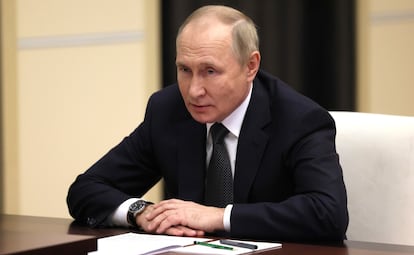When organized crime is the government
Corruption 3.0 deployed by autocratic governments in support of their geopolitical strategies is a threat to which the world has no effective response

Mohamed bin Salmán, the crown prince of Saudi Arabia; Xi Jinping, the president of China; and Tsar Vladimir Putin have plenty of things in common. Add this one to the list: all three have championed anti-corruption drives. Dictators all over the world have. Not surprisingly, they found plenty of corruption. Some of the accused were sentenced to death, and most others received long prison sentences.
Yet, there is no evidence that global corruption declined as a result. Rather, these anti-corruption campaigns are the preferred pretext for autocratic governments to get rid of their opponents. And while victories in the fight against corruption are few, its mutations are increasingly visible. Along with what we perceive as “normal” corruption, we must now add kleptocracy and, on top of that, mafia states.
“Normal” corruption is transactional. It occurs when a private citizen or an organization bribes a public official to gain an advantage. It is the traffic policeman who, in exchange for a payment, skips the speeding ticket, or the real estate developer whose secret kickback to a city official allows him to add a few more floors to the building under construction, or the contractor who promises the finance minister a 10% cut of a big government contract. This is classic corruption, version 1.0, to be found in a greater or lesser degree almost everywhere from Austria to Zimbabwe.
Classic corruption is harmful, of course, and must be kept at bay. It is a chronic disease that weakens society.
Unfortunately, in many countries, corruption goes much further. These are the nations governed by kleptocrats (from the Greek klepto, for theft, and cracy, government). It is a system where the president, prime minister, or monarch uses the resources of the nation as if they were his or her own and distributes them among their relatives, associates, political allies and high-ranking military officers.
We have seen kleptocracies on all five continents: from “Baby Doc” Duvalier’s to Nursultan Nazarbayev’s Kazakhstan. Many of these kleptocrats keep their people destitute while stealing the nation’s wealth. But not all. The classic contrast is between Mobutu Sese Seko, the bloodthirsty kleptocrat of Zaire (now the Democratic Republic of the Congo) between 1965 and 1997, and Suharto, the dictator of Indonesia between 1967 and 1998. Their periods in power very nearly match, and it was hard to tell who was the bigger thief. But Suharto allowed Indonesia to develop under his rule, while Mobutu did the opposite. Thus, the real per capita income of Indonesians increased 20-fold during Suharto’s term, while that of the Congolese fell 25% in those same 30 years.
As devastating as kleptocracy may seem, it is not the type of corruption we should be most worried about. Certain countries go further to become mafia states. In those countries, corruption goes from being a source of illicit enrichment for the rulers and their cronies to being used as an additional tool for statecraft. In Putin’s Russia, Maduro’s Venezuela and El Sisi’s Egypt, rulers use corruption as a lever to increase their power both domestically and abroad. Mafia states show corruption at its most devastating. Corruption 3.0. It is no longer about criminal groups influencing the government from the outside to make money, but about the seat of corruption shifting to the seat of government itself.
Vladimir Putin, for example, uses characters like Yevgeny Prigozhin, head of the Wagner Group – a mercenary army – to do the Kremlin’s dirty work all over the world. From his humble beginnings as Putin’s cook – or, well, head of the catering company that handled the job – Prigozhin rose in power and wealth alongside the Russian leader until he became a key accomplice. The grim record of human rights violations perpetrated by the Wagner Group has now left Putin’s cook no choice but to continue his support to the corrupt leader in perpetuity.
When we talk about corruption, then, it is important to specify which of these manifestations we are talking about. All three are harmful, but the second is far more harmful than the first, and the third much more than the second.
Corruption 3.0 deployed by autocratic governments in support of their geopolitical strategies is a threat to which the world has no effective response. Mafia states are not only a problem for judges, prosecutors and police officers, but a threat to the world’s democracies and to international security.
Tu suscripción se está usando en otro dispositivo
¿Quieres añadir otro usuario a tu suscripción?
Si continúas leyendo en este dispositivo, no se podrá leer en el otro.
FlechaTu suscripción se está usando en otro dispositivo y solo puedes acceder a EL PAÍS desde un dispositivo a la vez.
Si quieres compartir tu cuenta, cambia tu suscripción a la modalidad Premium, así podrás añadir otro usuario. Cada uno accederá con su propia cuenta de email, lo que os permitirá personalizar vuestra experiencia en EL PAÍS.
¿Tienes una suscripción de empresa? Accede aquí para contratar más cuentas.
En el caso de no saber quién está usando tu cuenta, te recomendamos cambiar tu contraseña aquí.
Si decides continuar compartiendo tu cuenta, este mensaje se mostrará en tu dispositivo y en el de la otra persona que está usando tu cuenta de forma indefinida, afectando a tu experiencia de lectura. Puedes consultar aquí los términos y condiciones de la suscripción digital.









































